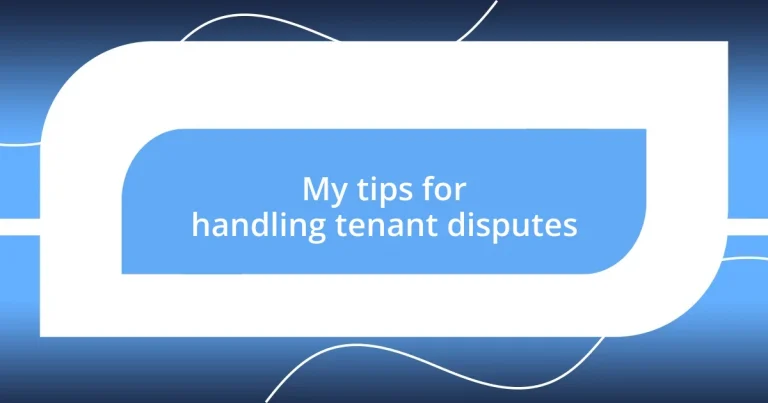Key takeaways:
- Effective communication and empathy are essential in addressing tenant disputes, often transforming frustrations into manageable conversations.
- Documenting interactions and establishing clear expectations can prevent misunderstandings and reduce the likelihood of future disputes.
- Being proactive in preventing disputes, such as through regular check-ins and fostering community, is vital for maintaining a harmonious rental environment.
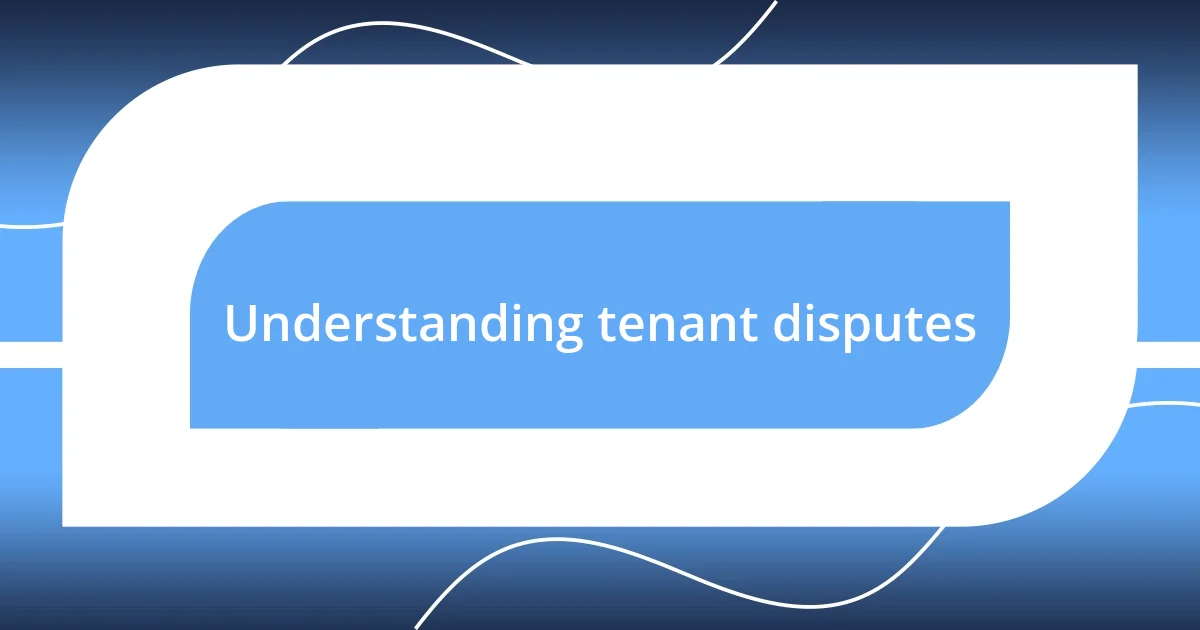
Understanding tenant disputes
Tenant disputes can arise over various issues, from late payments to maintenance requests. I’ve experienced conflicts where seemingly small problems escalated into larger tensions, often fueled by poor communication. Have you ever found yourself in a situation where a misunderstanding spiraled out of control? It’s more common than we’d like to admit.
One particularly stressful dispute I encountered involved a tenant who felt the heating wasn’t adequate during winter. As soon as they voiced their concerns, I assumed it was an easy fix. But looking back, I realize how important it is to address each complaint promptly. It teaches us that sometimes the emotional weight behind a complaint is just as critical as the issue itself.
Understanding the triggers for tenant disputes often starts with empathy. I’ve found that when I listen to my tenants, their frustrations transform into manageable conversations. How often do we pause and consider what others are feeling? It’s in those moments of connection that real solutions emerge.
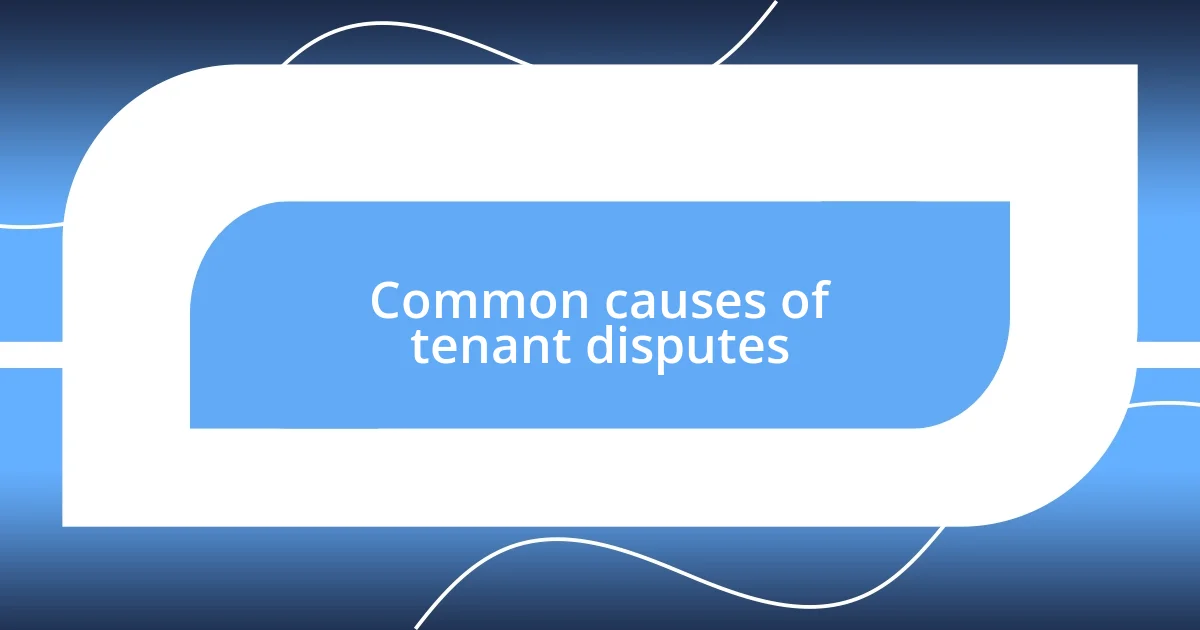
Common causes of tenant disputes
Tenant disputes often arise from miscommunication. For instance, I remember a situation where a tenant believed that certain repairs were the landlord’s responsibility, while I thought they were the tenant’s responsibility. It turned out that a simple clarification could have prevented weeks of back-and-forth emails and frustration. This emphasizes the importance of clear communication from the beginning.
Another common cause is the handling of security deposits. In my experience, tenants are often surprised by deductions made after moving out. I once had a tenant argue over what they considered normal wear and tear versus damages. Reflecting on this, I realized that having a detailed move-in checklist can be a game changer. It sets clear expectations and helps everyone stay on the same page.
Delays in maintenance can also trigger disputes. I once had a tenant who waited for weeks for a leaky faucet to be fixed. They started to feel neglected, leading to increased frustration and unease. This taught me that prompt responses to maintenance requests can significantly reduce tension and build trust.
| Cause | Example of Dispute |
|---|---|
| Miscommunication | Responsibility for repairs |
| Security Deposits | Disputes over damages vs. normal wear and tear |
| Maintenance Delays | Frustration from unaddressed repair requests |
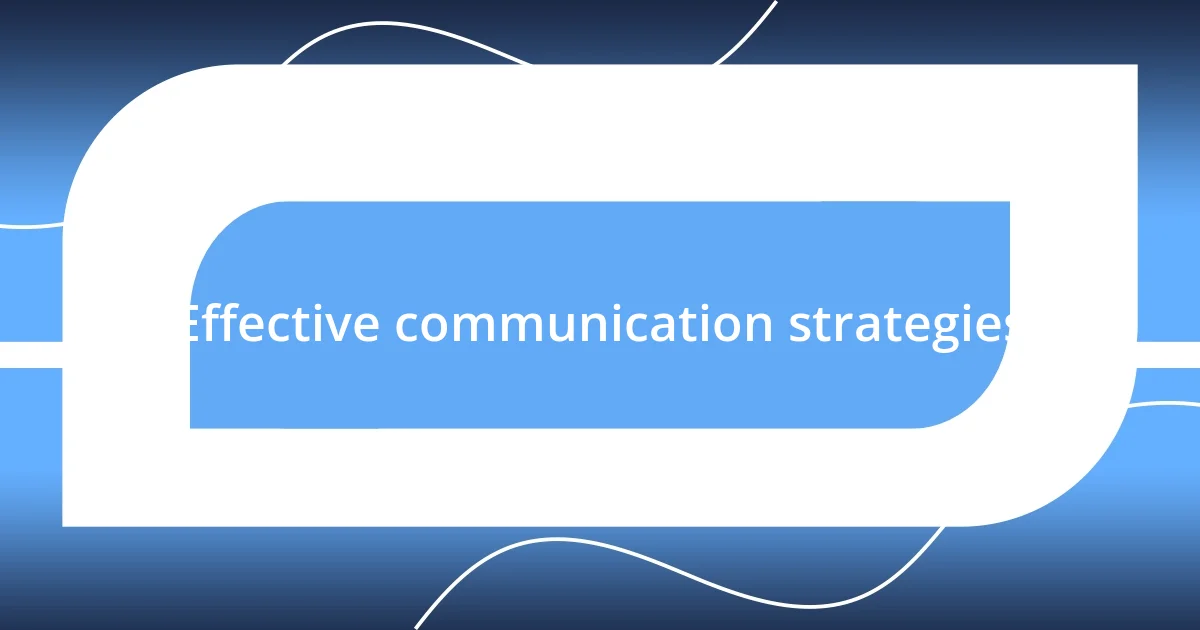
Effective communication strategies
When it comes to handling disputes with tenants, effective communication is paramount. In my experience, taking the time to clarify intentions and expectations can make a world of difference. I remember a time when I had a misunderstanding regarding rent payment dates. Once I reached out directly to my tenant to have an open conversation, it turned out they were genuinely concerned about their financial situation, and we were able to work out a more flexible payment plan. It was a moment that taught me the value of compassionate dialogue.
Here are some communication strategies that I find particularly effective:
- Active Listening: Focus fully on the tenant’s concerns without interruptions. It shows respect and builds trust.
- Establish Clear Expectations: Whether discussing repairs, payment schedules, or responsibilities, clarity pays off. Use simple language to ensure both parties understand the agreements.
- Regular Check-Ins: A brief chat or email can help gauge tenant satisfaction and preempt potential issues. Keeping lines of communication open fosters a supportive relationship.
- Written Communication: Follow up verbal agreements with a short email summarizing the discussion. It acts as a record and reduces misunderstandings later.
- Empathy in Responses: Acknowledge the tenant’s feelings. Even if you disagree, showing you understand their perspective helps defuse tension.
Incorporating these strategies has helped me not only to resolve disputes but also to build stronger relationships with my tenants.
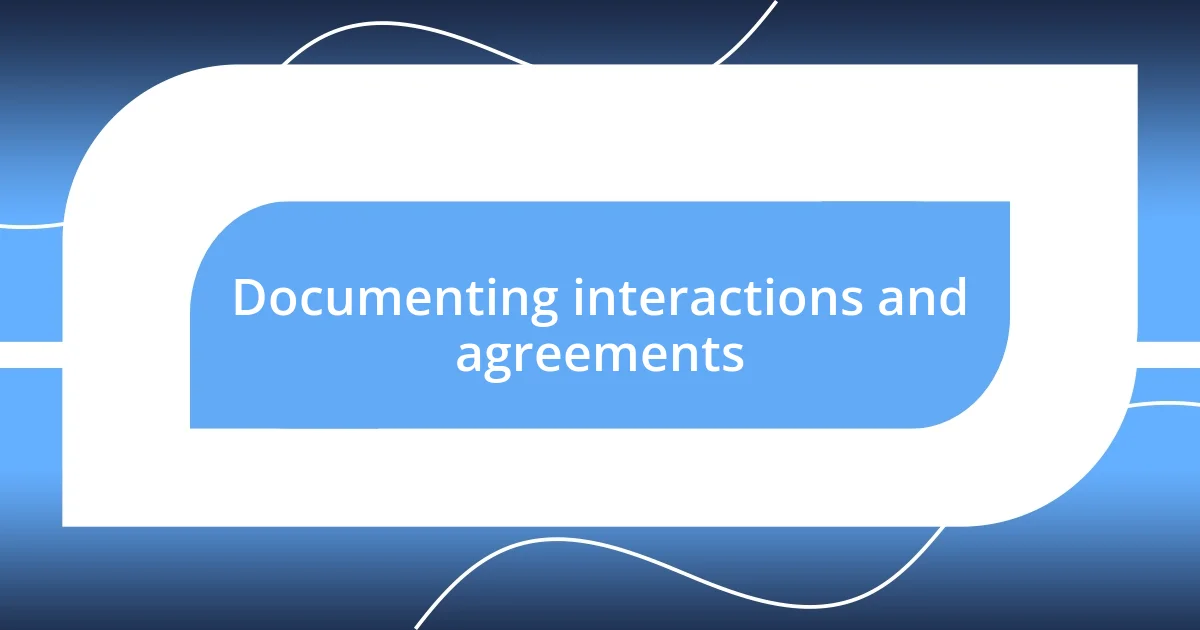
Documenting interactions and agreements
When it comes to documenting interactions and agreements, I’ve found that taking thorough notes can save a lot of headaches later on. For example, after a discussion about a maintenance request, I always jot down what was agreed upon, including timelines and responsibilities. This not only clarifies expectations but also provides a reference if there’s ever a dispute.
I’ve learned the hard way that a verbal agreement alone often isn’t enough. One time, I made a promise to a tenant concerning the timing of rent adjustments, but without anything in writing, it turned into a misunderstanding. They felt I had changed my mind, while I assumed we were still on the same page. Now, I make it a practice to confirm important conversations in an email, summarizing the key points. This small step transforms abstract discussions into clear, documented agreements that both parties can rely on.
It’s also essential to keep records of all communication, not just about agreements but also any issues that arise. I recall facing a dispute over a late payment. Because I had documented prior conversations and reminders, I could demonstrate my efforts to communicate and ensure the tenant was aware of their responsibilities. I encourage you to ask yourself: how well do you record your tenant interactions? Keeping accurate documentation can be your best ally in resolving future disputes amicably and efficiently.
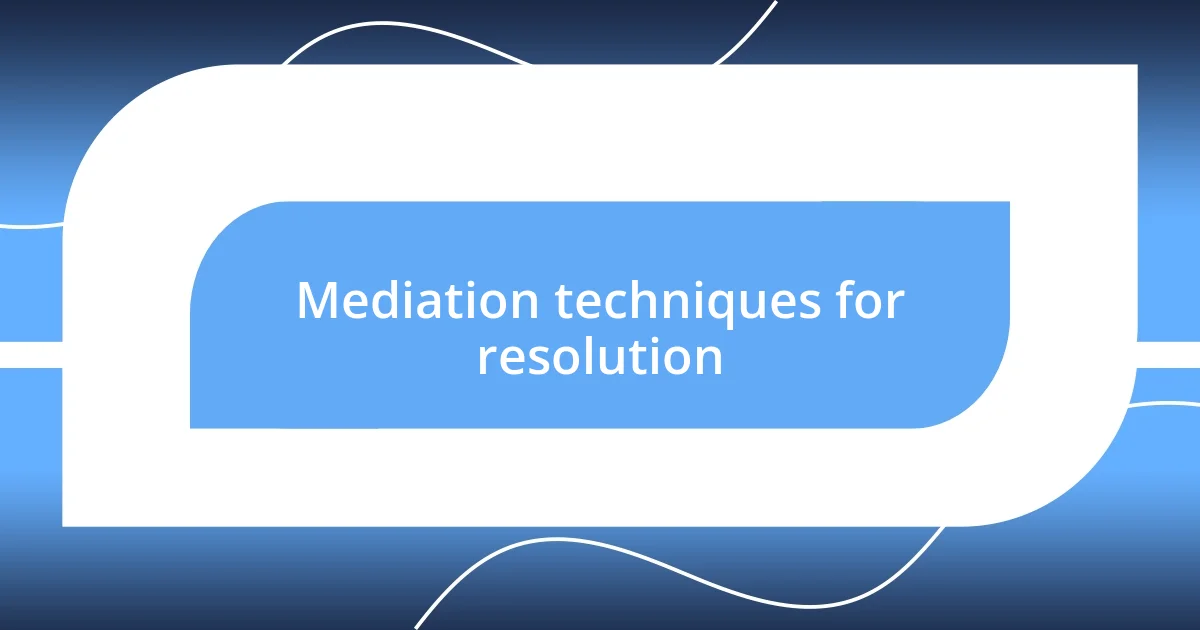
Mediation techniques for resolution
In the realm of mediation techniques, I’ve discovered that establishing a neutral environment is key. I once hosted a mediation session in my backyard, far from the formalities of an office. This relaxed setting allowed both my tenant and me to express our viewpoints more openly. I can’t stress enough how a comfortable space can lower defenses and foster cooperative dialogue.
One effective technique I often employ is reframing. During a particularly tense negotiation about maintenance responsibilities, I found myself repeating my tenant’s concerns in a more positive light, emphasizing we both wanted a solution rather than focusing on the blame. This shift not only defused tension but also encouraged us to collaborate on a creative resolution. Isn’t it interesting how changing the narrative can change the outcome of a discussion?
Lastly, I recommend setting collaborative goals during mediation. Instead of focusing solely on individual wants, I encourage tenants to consider shared outcomes. I once asked a tenant, “What would make this situation a win-win for both of us?” This question turned our negotiation from adversarial to cooperative, and together we crafted an agreement that satisfied both our needs. Engaging questions like this can transform a stressful mediation into an enlightening partnership.
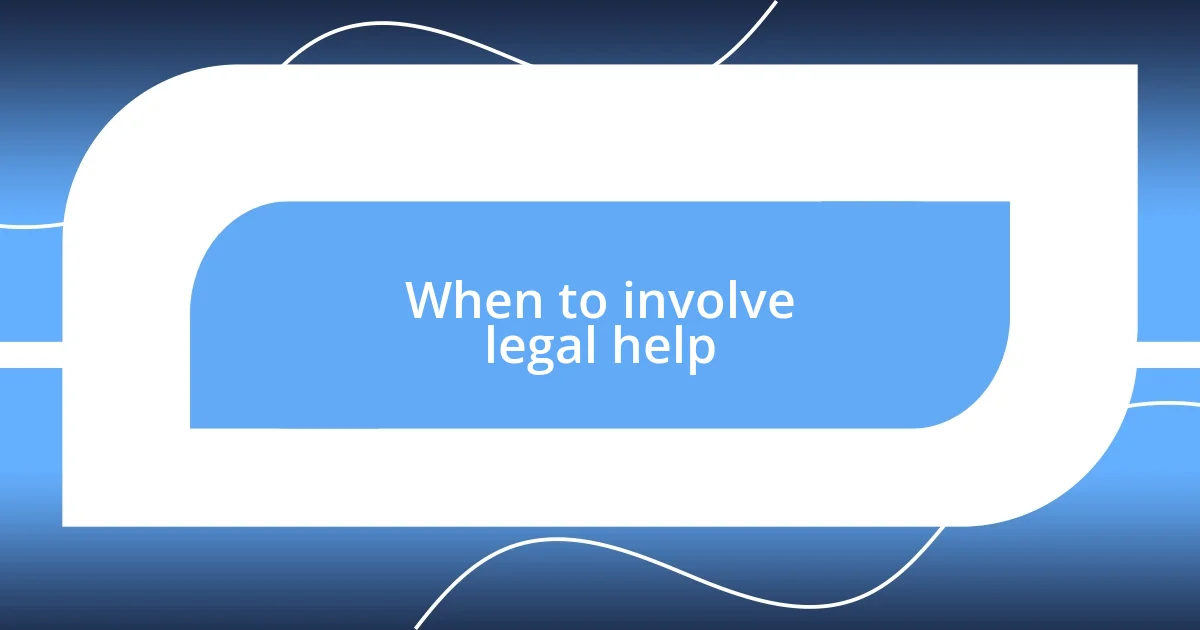
When to involve legal help
Knowing when to involve legal help can be a tricky decision. I remember a situation where a tenant started ignoring their rental payments, and despite my repeated attempts to reach out and mediate, the communications went nowhere. It hit me that when basic resolutions fail, and I felt like I had exhausted all other options, it was time to consult a lawyer. Legal professionals can provide clarity on the eviction process and ensure that your rights are protected.
Sometimes, the law is more than just a last resort; it can be an essential step in protecting your investment. I had a friend who faced an aggressive tenant who was damaging property and refusing to move out. After multiple confrontations, my friend wisely sought legal advice. The attorney helped him understand his rights, crafted a formal notice, and ultimately led to a peaceful resolution. Have you considered who you’d turn to for legal guidance in a similar situation?
Involving legal support doesn’t always mean going to court; it can also involve getting help with tenant agreements or lease violations. I’ve found that when I feel backed by legal expertise, it empowers me to make informed decisions. I appreciate how knowing the right steps to take makes everything less overwhelming. If a dispute is escalating beyond repair, don’t hesitate to reach out for legal help—it’s a pragmatic approach to safeguard both your interests and your sanity.
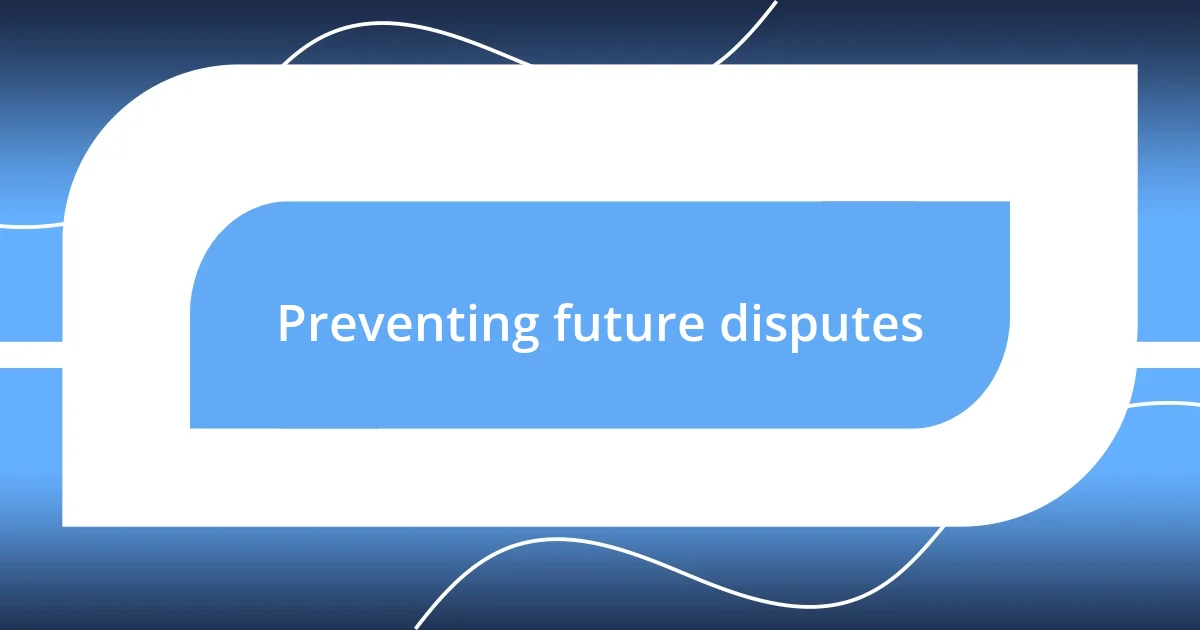
Preventing future disputes
To effectively prevent future disputes, clear communication from the start is crucial. In my experience, outlining expectations in the lease agreement has made a world of difference. I remember drafting a lease that explicitly detailed maintenance responsibilities, which led to fewer disagreements over time. Have you ever thought about how clarity can cut through misunderstandings?
Creating a tenant feedback loop can also be immensely helpful. I make it a habit to regularly check in with my tenants to gauge their satisfaction and any potential issues. During one of these casual conversations, a tenant shared concerns about noise that I hadn’t even noticed. By addressing their worries proactively, I not only reinforced our relationship but also sidestepped what could have escalated into a dispute.
Lastly, fostering a sense of community can transform a rental property into a harmonious environment. I once organized a small gathering for all my tenants, which allowed them to connect and share their experiences. The result? They began supporting each other, which led to less friction and more understanding. Have you considered how community-building could serve as a powerful tool in dispute prevention?












